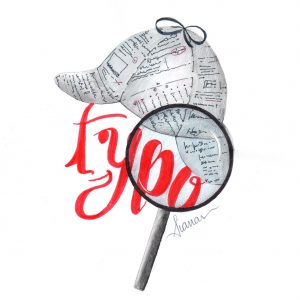 This month I’m celebrating eight years in the business of English editing. I’ve spent more time working as a nonfiction editor and proofreader than as a geologist, the profession for which I trained till PhD level. It’s about time that I looked back at my freelance editing career to see what big lessons I’ve learned along the way.
This month I’m celebrating eight years in the business of English editing. I’ve spent more time working as a nonfiction editor and proofreader than as a geologist, the profession for which I trained till PhD level. It’s about time that I looked back at my freelance editing career to see what big lessons I’ve learned along the way.
What’s it like to be a freelancer? If you’re not one of us, you’ll tend to believe the freelancing myths populating the analog and digital worlds: If you’re a freelancer, you work only a couple of hours a day, pick your clients, have no boss, and can set your own schedule. Just add “you can wear your pajamas all day” and the freelancer stereotype cocktail is ready to serve.
Over the years, I’ve heard all kinds of comments about freelance life, covering the whole spectrum from funny to offensive. Here are a few:
- Close family member: “When do you plan to get a real job?”
- Not-so-close family member: “Right…you ‘work’ from home.”
- Other people:
- “What’s it like to sleep as much as you want every weekday?”
- “I wish I had a good work-life balance like you.”
- “A freelancer? So you married rich, huh?”
- “Will you do these errands for me while I’m at the office? You must have tons of time.”
- “Freelance editor? I wish I could quit my job and do what I like.”
 This post was written in 2017 and revised in 2022.
This post was written in 2017 and revised in 2022.
“It was the best of times, it was the worst of times…”—Charles Dickens, A Tale of Two Cities
This quote describes almost perfectly my experience as a freelance editor on Upwork.
When I decided to become a freelance English editor, I didn’t know where to start. I had no clue where to find projects and I lacked both professional editing experience and confidence in my skills. So I did what many newbie freelancers did at the time: opened an Odesk (now Upwork) account.
For those who have never heard of Upwork, it’s a website that connects freelancers with clients. Freelancers get paid through the platform, which keeps a big chunk of their earnings. Freelancers and clients rate each other at the end of each contract.
It took me several months to get my first job on Upwork. I completed it and received my first 5-star rating. Getting new contracts became easier, though still incredibly frustrating. Before I knew it, I was spending all my time on Upwork. I submitted proposals in the morning, and I worked on my projects in the afternoon and evening.
Almost 200 successfully completed contracts and thousands of unsuccessful job bids later, I realized I was just plowing the sands. I was wasting precious time completing applications for jobs that were later canceled, Upwork had doubled its fees, and the quality of the job postings was plummeting. What was I doing on Upwork?
So, in 2015 I made a big decision: quit Upwork, get a website, and work on building my own client portfolio, not Upwork’s.
In this post, I’ll describe what it’s like to work as a freelance editor on Upwork. Then I’ll tell you why I used Upwork for so long and why I decided to close my account. I hope this information will give you an idea about what to expect if you work on Upwork as a freelance English editor.
Are you looking for a freelance editor and want to make the most of your budget for editing? Avoid paying third-party fees by hiring a freelance editor directly. Send me a message at editor@languageediting.com.
 H. is a Cambridge graduate who found writing is better for her mental health than scientific research. T. is a part-time teaching assistant who writes part-time to make ends meet. L. is a freelancer who writes digital content when her baby is sleeping. M. is a retired IT technician with a career spanning from punch cards to cloud computing who writes to keep her mind sharp and a roof over her head. These, and many other people you’ll never know, ghostwrite web content for a living.
H. is a Cambridge graduate who found writing is better for her mental health than scientific research. T. is a part-time teaching assistant who writes part-time to make ends meet. L. is a freelancer who writes digital content when her baby is sleeping. M. is a retired IT technician with a career spanning from punch cards to cloud computing who writes to keep her mind sharp and a roof over her head. These, and many other people you’ll never know, ghostwrite web content for a living.
They’re professional writers who work full-time or part-time from their home offices. They’re not doing some freelance content writing on the side while hopping around the world.
Most of the content online—LinkedIn posts by thought leaders, company blogs by marketing experts, magazine articles by CEOs, whitepapers by Fortune 500 companies, and more—was ghostwritten.
Almost all businesses that have a website are publishers, and many hire web content ghostwriters. If you own a growing business and have a presence online, sooner or later you’ll need a content writer, whether on an ad hoc basis or on staff.
If you’ve never hired a web content writer before, you might not know many things about their work. This post illustrates some less-known aspects of a freelance content writer’s job to help business owners improve their relationships with their freelance writers. Read More
I was born in Bucharest, Romania, and learned English when I was 11 years old. Two decades later I became a freelance English editor.
Who needs freelance English editors?
When I was a fledgling research scientist, I didn’t know there was such a thing as a freelance English editor or proofreader. Only publishers had copyeditors and proofreaders on staff, I thought. Research scientists who had manuscripts in need of revision didn’t hire freelance English editors. They asked a colleague whose first language was English to review their drafts. That’s what people around me were doing. I didn’t. I should have. Read More


